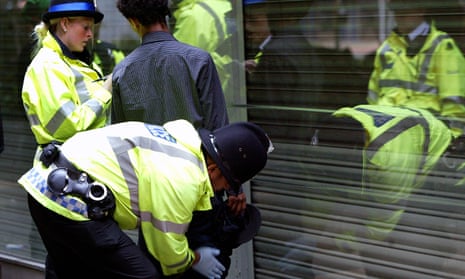What is the government’s new crime plan?
It is a phalanx of announcements and measures the government claims will cut crime and make the public feel safer. There is some more money for medium- to long-term measures such as drug treatment and violence reduction units spearheading a public health approach.
But the government, led by the prime minister, has tried to sound tough, talking about “chain gangs” for relatively minor offenders.
Within policing there is some anger, and in private, some mockery.
What does it say about stop and search?
There are two types of stop and search. One requires an officer to have reasonable suspicion of crime. That is used nine times more against black people, official figures for England and Wales show.
One issue with stop and search is that the vast majority targets the innocent – it is in the very nature of the tactic.
But the government is making permanent a change to the other type of stop and search, which is even more racially charged. That is called section 60 and allows stops without any need for reasonable suspicion.
When Theresa May was home secretary it was made harder and subject to greater scrutiny before police could issue a section 60 order. Now it is going back to being made easier.
Is the Conservative government right on stop and search?
The answer to this is yes and no. It depends which recent Conservative government you are talking about.
On Tuesday Boris Johnson claimed stop and search, presumably talking about section 60, was a loving act.
But in 2015, when May was home secretary, she said: “If you look at the evidence – it shows no link whatsoever with violent crime.”
When stop and search is misapplied, and when people are stopped and searched for no good reason, it is unfair, it wastes valuable police time, and it damages the relationship between communities and the police,” she added.
So as top Conservatives don’t agree, what do others say?
Young black males in London were 19 times more likely to be stopped and searched than the general population, a study of official data by University College London’s Institute for Global City Policing shows.
Her Majesty’s Inspectorate of Constabulary has castigated police forces over stop and search, saying that 35 years after the power was introduced they were still unable to explain why black people are more likely to be targeted.
The watchdog said in a report published in February that public trust was in danger, with police unable to provide evidence of why black people were nine times more likely to be stopped than white people in England and Wales.
HMIC said the most common reason given for stops was drug possession and questioned whether this was an effective use of the power or police time, given that so little was found.
The College of Policing, which sets standards for law enforcement, says that focused “tough” action by police, such as intelligence-led stop and search, can suppress rises in stabbings only in the short term. The Met is the biggest user of the tactic, and cites the fact it helps officers take hundreds of dangerous weapons off the street every month.
What have police said about the package of measures?
Police have been taken aback because neither police chiefs nor the federation, which represents 130,000 rank and file officers, were consulted.
The fed has publicly criticised the plans as “ill thought out” and containing “gimmicks”.
Behind the scenes police chiefs made it clear some of the measures were old, some were already in place, and some may divert resources from where they could be better used.
Will the plans help cut crime?
The consensus seems to be in policing at least, no.
Police also point out they are far away from having the officers and resources they had when the Conservatives started cutting them from 2010.
The government’s 20,000 boost to officer numbers is on track and is welcome, but the second biggest force in England, West Midlands police, will still have 1,000 officers fewer than in 2010, even after it has recruited all the officers the government will fund.
But because the government has kept police budgets static, a so-called flat cash increase, chiefs say this is in effect a cut of 3% to 4%, given the rate of inflation. They are also seeing huge demand on them as lockdown lifts, with levels of calls in the last few weeks at the level they would expect around New Year’s Eve, traditionally the time of year they face most calls.
